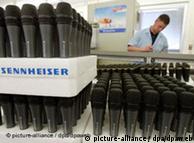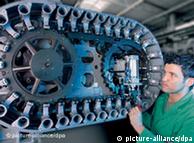Germany | 27.10.2007
German Firms Return Home As Risks Outweigh Benefits Abroad
In the 1990s, many mid-sized German company owners had their eyes set on one thing: Eastern Europe. The lure of reducing costs proved irresistible . Now, a new study shows that many are returning to Germany.
It sounds like pennies from heaven: move the company abroad and make a lot of money. Indeed, in the 1990s, it was low wages, minimal transportation costs and few social insurance contributions that fueled the flight of many mid-sized German companies to to Eastern Europe.
A new study by the Fraunhofer Institute, however, shows that one in four to five companies make their way back to Germany within two years of establishing production facilities abroad. Just one example: 1,200 companies within the metal and electrical industry returned to Germany in a two-year period.
Steffen Kinkel of the Fraunhofer Institute said one reason is that entrepreneurs often underestimate other costs involved in production abroad.
"I've heard people say that quality of any kind can be achieved at any site in the world," Kinkel said. "I agree, but the question is how much time I need and how much it will cost me to achieve that."
Quality takes time
 Bildunterschrift: Großansicht des Bildes mit der Bildunterschrift: "Made in Germany" still ensures quality for many
Bildunterschrift: Großansicht des Bildes mit der Bildunterschrift: "Made in Germany" still ensures quality for many
After all, it takes time to train local employees, find suppliers and to ensure that production runs smoothly. Kinkel said many German companies do not reckon with such investments over a longer period of time.
The company Data Systems, based in Braunschweig, considered all the above factors when it set up a base in Poland five years ago. Still, a year ago, it moved its production back to Germany.
Due to the economic boom in Poland, local workers had begun demanding higher wages. While employees used to be content with earning 1,000 euros ($1,400) a month, toward the end, they were demanding 2,500 euros, said managing director Willi Süß.
"What happened is that labor costs rose from between 20 and 30 percent within a year," Süß said.
"Even if it meant a difference of around 50 or 100 euros, some employees would just move on to other companies. Employees were quitting immediately if they didn't get their raise," he added.
Protective of ideas
 Bildunterschrift: Großansicht des Bildes mit der Bildunterschrift: Times have changed: women used to provide cheap labor at Volkswagen in the '50s
Bildunterschrift: Großansicht des Bildes mit der Bildunterschrift: Times have changed: women used to provide cheap labor at Volkswagen in the '50s
Another German company did not even bother locating abroad. Sivaplan, a builder of shelving systems, kept their offices and production near Cologne. Managing director Rainer Hegele said his company was motivated to stay put in Germany by a different reason -- fear of intellectual copyright infringement.
"We received an offer from an Eastern European company that was producing a central component used in high shelving systems," said Hegele. "We actually produce these components ourselves here, and we were amazed at how well the Eastern European engineers could create these special elements."
Initially, the Eastern European company manufactured the components for German firms. Then, it began marketing them itself, creating competition for the German sellers.
Using knowledge to one's own advantage
 Bildunterschrift: Großansicht des Bildes mit der Bildunterschrift: Daimler entrusts production to China
Bildunterschrift: Großansicht des Bildes mit der Bildunterschrift: Daimler entrusts production to China
It's nothing unusual, Hegele said.
"It's a clever thing for Eastern European countries to do and it is not exactly forbidden," he said. "The companies build upon the knowledge they have gained from working with German companies."
Even if German companies do move their offices or production back to Germany due to bad experiences abroad, that does not mean more jobs will be created in the country, said Kinkel of the Fraunhofer Institute. After all, the firms do not alter their goal of cutting down on personnel costs. Some of the companies which relocate production merely replace human workers with machines, he said.
At the same time, many German companies remain undeterred by the pitfalls involved in moving production abroad. According to a recent study by the German Chamber of Commerce and Industry, nearly half of all German industrial companies want to invest abroad this year.
Production, after all, follows the market. As China opens up unimaginably endless opportunities to foreign companies with its booming domestic market, it makes good business sense to establish production there.

Comments